Dubbing artists talk about their jobs
By Michelle Chow
They act through their voices, they even have fans, but they do not have to be good-looking or born with a great body. Dubbing artists, who project the personalities of characters with their voices, are engaging in an art form. Dubbing is commonly perceived as a funny career. But it is not as easy and simple as most people think.
Generally, dubbing artists preview the animation, movie or documentary only once before the actual dubbing. They only have a "rewrite" to match the action on the screen. The "rewrite" is the translated Cantonese script that fits the opening and closing of the mouths of the characters. Moreover, there is more than one studio doing dubbing, so dubbing artists have to rush around town to dub different programs.
"This is why sometimes dubbing is a high pressure occupation," said Ms Xenia Wong Yuk-kuen of Asia Television Limited, who dubs voices of Crayon Shinchan and female Ranma.
Behind the pressure there is always fun. Mr. Steven Wong Chi-sing of ATV, who started his career in 1970, does the voice in Ranma 1/2 for Tatewaki Kuno.
"Sometimes we rush from one studio to another and hardly get a second to follow the story," he said. "You may forget to change a young man's voice for an old man's on the screen."
To be a professional dubbing artist, one must try characters ranging from different ages and sexes to animals and various personalities.
Said ATV's Mr. Tsang Ping-fai, who has done this for 20 years: "To do voices for animals is the funniest thing."
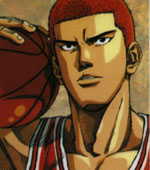 |
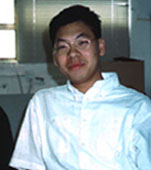 |
Mr. Leung Chi-tat of ATV does the voice for Hanamichi Sakuragi in Slam Dunk. He said, "Some roles like whales or dolphins are difficult since I have never heard of their voices."
Dubbing sometimes is not so funny as it seems, said Mr. Jimmy Kwok Chi- kuen of Television Broadcasting Limited. "In small, dim, cold studios, I feel lonely when facing the screen and the script, instead of my colleagues, even when we are dubbing a love story.
"The worst thing is when we have a sore throat, but still have to play the roles of kids."
Ms Sharon Leung-siu Ha of TVB does the voice of Sailor Mercury in Sailor Moon.
"I had the experience of losing my voice for one week and needed to see a doctor. Since then, my voice has become thicker," she said.
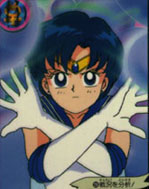 |
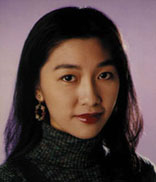 |
"It is hard to laugh when we have personal problems," said ATV's Mr. Wong.
Mr. Leung had more to say about the difficulties. "Characters that keep speaking give me headache."
Said Mr. Lam Po-chuen of TVB, who does the voice of Doraemon: "Characters who open their mouths a lot or move around before they really speak require dubbing artists to follow them closely. This is what we don't like the most."
Another problem is trying to live up to the reputation of master artists. "I feel pressure whenever I have to do voices of the so-called 'classical' characters, as I am afraid that I can't do better than the old artists," said Mr. Kwok.
Dubbing artists cannot choose roles, but are assigned them by the directors and producers. Ms Chow Man, the Cantonese dubbing director at ATV, said, "I choose them when I think their skill and the quality of their voice can fit in."
Dubbing requires acting under constraints. It depends strictly on what appears on the screen. Dubbing artists seek to follow the tone and mood of the original dubbing.
Mr. Kwok of TVB, who dubs the voice of Vegeta in Dragon Ball, aims to make the most out of it.
"I try to be creative and strike for breakthoughs in my characters." In Yu Yu Hakusho, he prefers to use local slang to suit teenagers' tastes.
It was interest that drove most of them to be enrolled in training courses and to stay in the career. Mr. Lam of TVB, and Mr. Tsang and Ms Wong of ATV, share this feeling. They said they get something new every day, from the script to the entire movie or animation. Dubbing is never boring.
Mr. Lam revealed his job satisfaction and enthusiasm when he recalled the characters.
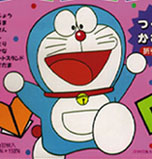
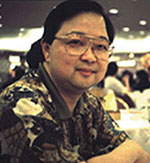 |
"I have been doing voice for Doraemon since 1973. Since the funny Ninja Teacher in Ninja Boy sometimes disguises as a woman, I have to switch my voice. In movies, I narrate the script of Hung Kam Bo."
Ms Leung treasures the intimate relationships among colleagues.
She said, "The whole dubbing team enjoyed the Japanese drama Below the Same Roof very much," said she. "While I did voice for the youngest sister, Siu Mui, Mr. Chan Yan and Mr. Kwok were really like my brothers."
Fans' support gives them much encouragement. Many fans send postcards and keyholders of the characters they dubbed and request signatures.
"Letters from fans are important to us," said Mr. Tsang. "It is through their comments that we improve ourselves."
To be a dubbing artist, training is indispensable. Potential dubbing artists not only learn the procedures and theoretical skills from these courses; they also have the chance to develop relationship with the instructors and other people in this field. This helps newcomers gain entry to the career.
Some experienced dubbing artists and producers conduct training courses elsewhere. Ms Wong started her career 6 years ago, and Mr. Leung Chi-tat joined in 1993.
Mr. Lam taught dubbing when he had his own company. One of his students, Ms Wong Fung-ying, is now a colleague at TVB. She does the voice of Sailor Uranus. A dubbing artist should at least be able to make three kinds of voices — the teenage, the middle-aged and the old. As Ms Leung said, outsiders do not know their work very well.
"Dubbing does not only involve making various funny voices," said she.
Mr. Lam said, "Dubbing demands a great deal of emotions and the choice of tone." "Quick responses are most important," said Ms Tam Suk-ying of ATV, who does voice of the mother of Crayon Shinchan.
Ms Wong added, "As we have to rush from one studio to another, one must promptly match the screen with the script."
Said Ms Leung: "The ability to speak clearly, correctly and fluently, as well as having potential in acting are important."
None of them mentioned a need for a pleasant voice.
TVB's Mr. Kwok said, "The flexibility and range of voices are more important."
"Besides," added ATV's Ms Chow, "professional dubbing artists must be able to play a wide range of characters."
Mr. Lam added, "Diligence and strong interest are most important."
As for Mr. Kwok: "Dubbing is an art. I consider the characters I have played as my sons and daughters."
Meanwhile, Mr. Lam never thinks of retirement.
He said, "I love my job."

